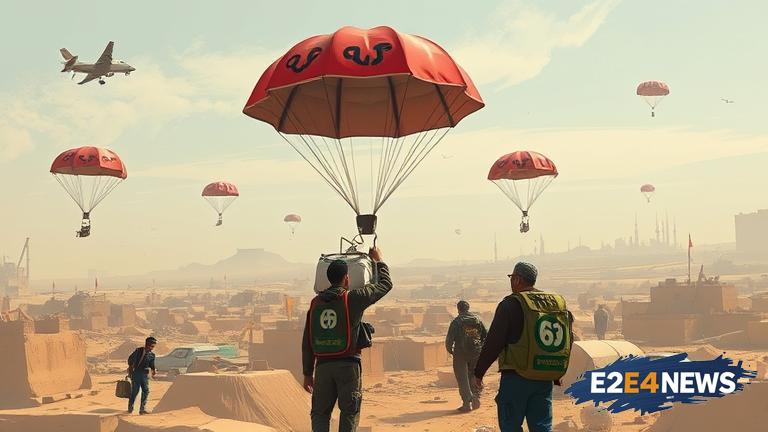The Israeli government has announced that it will allow food drops into the Gaza Strip, in an effort to alleviate the humanitarian crisis in the region. This decision comes as a response to the growing concerns over the dire situation in Gaza, where civilians have been struggling to access basic necessities such as food and water. The conflict between Israel and Hamas has been ongoing for several weeks, resulting in significant damage to infrastructure and a severe shortage of essential supplies. The food drops, which are expected to begin shortly, will provide temporary relief to the affected population. However, many experts warn that this measure is only a short-term solution and that a more comprehensive approach is needed to address the root causes of the crisis. The Israeli military has been working to facilitate the delivery of aid, while also ensuring the safety of its citizens. Meanwhile, Hamas has been accused of using civilians as human shields, which has further complicated the situation. The international community has been calling for a ceasefire and an end to the violence, but so far, a lasting resolution has not been reached. The United Nations has estimated that over 1 million people in Gaza are in need of humanitarian assistance, with many more at risk of displacement. The conflict has also had a significant impact on the regional economy, with trade and commerce severely disrupted. In response to the crisis, several countries have pledged to provide financial and humanitarian aid to Gaza. The European Union, for example, has announced a significant package of assistance, which includes funding for food, shelter, and medical care. The United States has also provided support, with a focus on addressing the immediate needs of the affected population. Despite these efforts, the situation in Gaza remains precarious, and many are warning of a potential catastrophe if the conflict is not brought to an end. The Israeli government has stated that it is committed to finding a peaceful solution, but the path forward remains uncertain. In the meantime, the people of Gaza continue to suffer, with many forced to live in makeshift shelters and without access to basic necessities. The psychological toll of the conflict should not be underestimated, with many civilians experiencing trauma and stress. The need for a lasting resolution is clear, and the international community must continue to push for a peaceful and sustainable solution. The role of the media in covering the conflict has also been a subject of debate, with some accusing certain outlets of bias and misinformation. Social media has played a significant role in shaping public opinion, with many using platforms to raise awareness and mobilize support for the people of Gaza. As the situation continues to unfold, it is essential that accurate and unbiased information is disseminated to the public. The use of technology, such as drones and satellite imagery, has also been used to document the conflict and provide evidence of human rights abuses. In conclusion, the humanitarian crisis in Gaza is a complex and multifaceted issue, requiring a comprehensive and sustained response from the international community. While the food drops are a welcome development, they are only a first step towards addressing the deeper issues at play. A lasting resolution will require a commitment to peace, justice, and human rights, as well as a willingness to address the root causes of the conflict.
